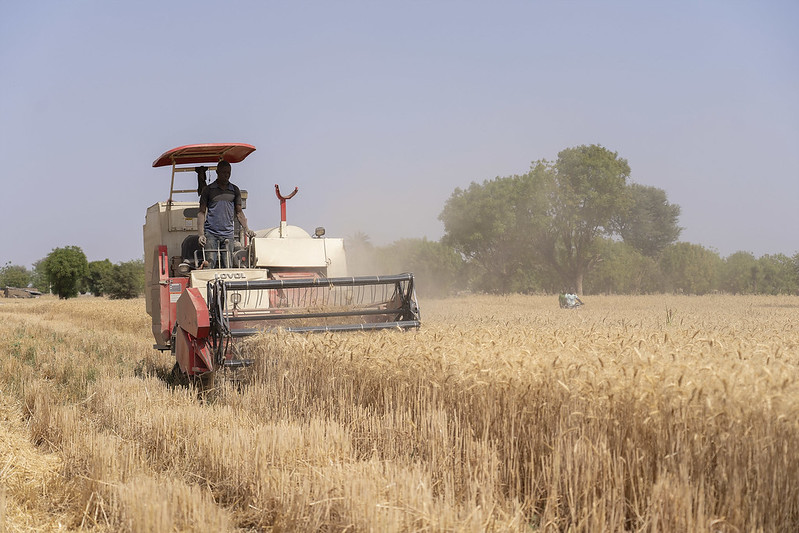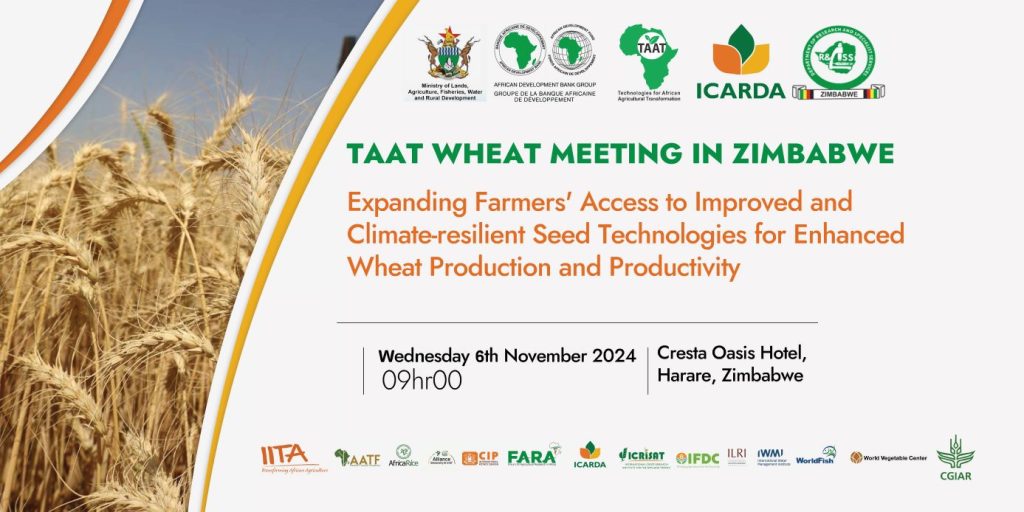
By Ekouya Suzanne HOUEFONDE
Zimbabwe’s wheat harvest for 2024 has achieved 92% of its target of 600,000 metric tons, overcoming various climate challenges.
The government remains dedicated to advancing agricultural innovation and ensuring food security by investigating summer wheat cultivation and collaborating with Technologies for African Agricultural Transformation (TAAT) to enhance both the quality and yield of wheat.
Zimbabwe’s wheat harvest for 2024 has marked a significant achievement, with 555,824 metric tonnes (MT) already harvested.
This figure brings the country closer to its ambitious target of 600,000 tonnes, despite the challenges posed by climate conditions.
Farmers have cultivated 121,900 hectares of wheat this year.
A notable 46% of the harvest has been delivered to depots of the Grain Marketing Board (GMB).
In addition, 3% of the harvest was sold via the Zimbabwe Mercantile Exchange (ZMX), while the remaining 51% was distributed to private buyers, including National Foods, Victoria Foods, and Blue Ribbon.
Advancement amidst obstacles
Official sources report that current wheat deliveries amount to 186,682 MT, slightly lower than the previous year’s total of 199,459 MT.
Despite this decrease, the overall harvest signifies the country’s steady progress toward achieving self-sufficiency in wheat production.
The agricultural sector is facing considerable challenges due to climate change and drought influenced by El Niño.
In response, the government has enacted measures to counter these effects and ensure food security, such as implementing the Africa Risk Capacity Sovereign Drought Insurance as a preemptive risk management tool.
Leonard Munamati, Acting Chief Director of Agricultural and Rural Development Advisory Services (ARDAS), acknowledged that early rains have caused some minor delays in harvesting but expressed confidence in achieving the season’s yield goals.
“We are currently conducting surveys on the remaining harvest, and we remain optimistic about producing favorable results this season,” he remarked.
Towards a bumper summer wheat harvest
The government is actively investigating the viability of summer wheat cultivation to enhance wheat production.
This progressive strategy seeks to diversify agricultural practices and lessen dependence on winter wheat.

At the just concluded Wheat Stakeholders Meeting organised by the Technologies for African Agricultural Transformation (TAAT) in Harare, Prof. Obert Jiri, the Permanent Secretary for Lands, Agriculture, Fisheries, Water, and Rural Development, emphasised the importance of identifying wheat varieties that thrive in warmer climates.
With the theme, “expanding farmers’ access to improved and climate-resilient seed technologies for enhanced wheat production and productivity,” the African Development Bank, through its TAAT programme, is supporting Zimbabwe in its quest to boost agricultural efficiency through the cultivation of superior wheat varieties.
“We continue to depend on imported high-quality wheat to mix with our domestic production.
The TAAT initiative will enable us to synchronize our flour production with local climate conditions while increasing yields,” Jiri stated.
Consequently, Zimbabwe has established itself as a prominent African wheat producer, coming second to Ethiopia and underscoring the government’s dedication to agricultural advancement and food security.
As the harvest progresses, the agricultural sector demonstrates resilience, utilising research, collaborations, and adaptive farming techniques to satisfy the rising demand for wheat in the nation.
A commitment to scaling innovations
Established in 2018 as a central pillar of the African Development Bank’s Feed Africa strategy, TAAT represents a transformative initiative to reverse the trend of declining food productivity in Africa through the scaling of modern food production technologies to 40 million farmers across Africa, focusing on supporting young people and women in low-income regions.
TAAT has scaled up the dissemination of heat-tolerant wheat varieties, drought-tolerant maize, high-yielding rice, cassava, high-iron bean, sorghum, millet, orange-fleshed sweetpotato varieties and high-quality livestock breeds, and fingerlings to more than 12 million farmers, boosting crop production by an estimated 25 million tonnes.
This increase in food production is a testament to the programme’s effectiveness in enhancing agricultural productivity across the continent.
TAAT acquires cutting-edge technologies from developers and agricultural research institutions led by the CGIAR for several agricultural value chains covering crops, livestock and fisheries, vets them for scaling readiness and integrates them into its electronic technology catalogue.
TAAT engages governments to integrate proven technologies into their large-scale agricultural investment programmes and partner with the private sector to commercialise them.











